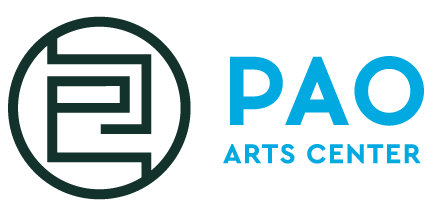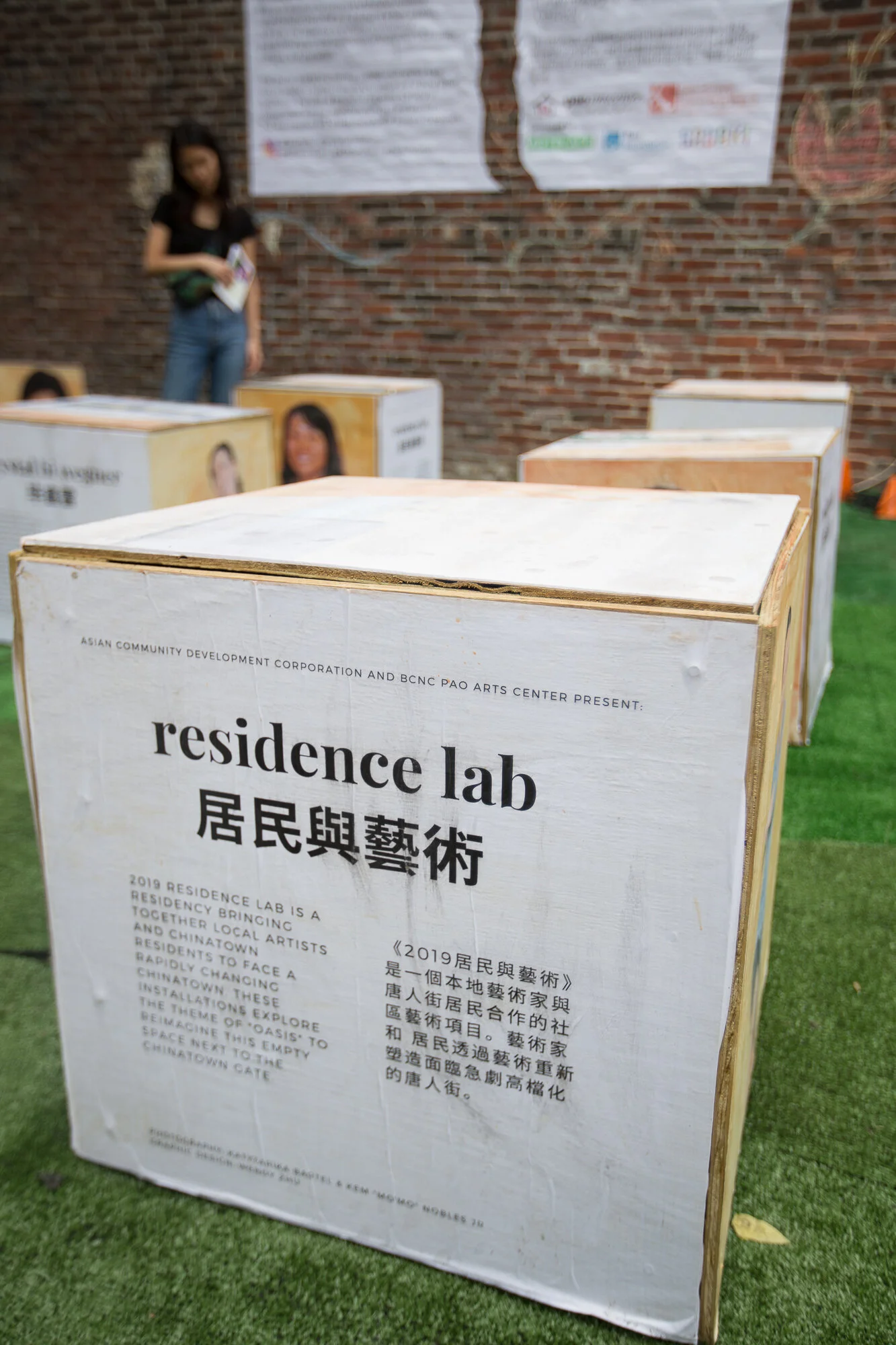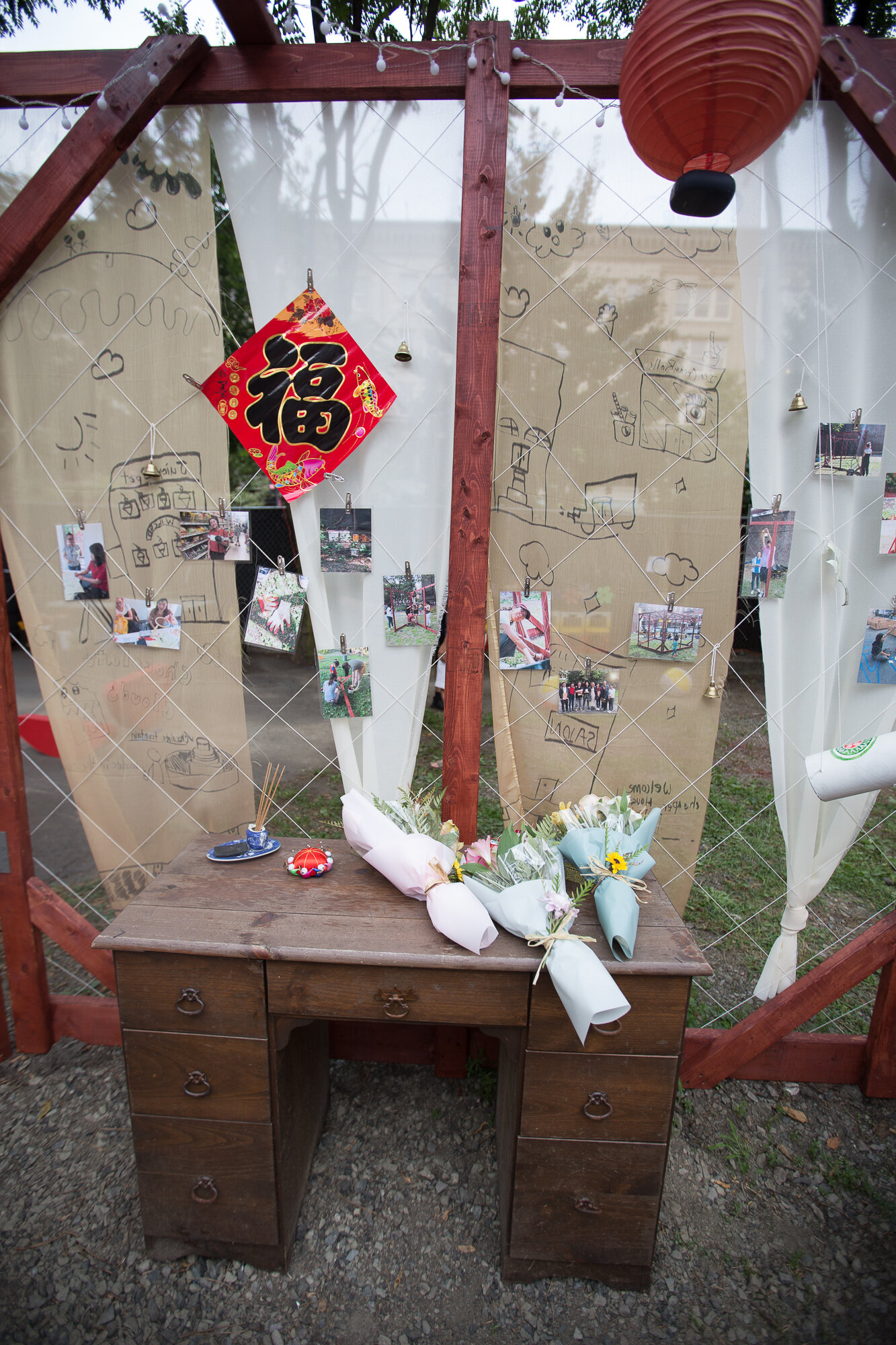Residence Lab 2019
Photo credit: Black Dog Pictures
UPLIFT, 2019
Tarik Bartel, Joyce Chen, and Maggie Chen
Interactive wood cubes arranged on astroturf, featuring photography by Tarik Bartel and Kem “Mo’Mo” Nobles Jr. and graphic design by Wendy Zhu.
This interactive sculpture piece, titled UPLIFT, is the product of a conversation between Tarik Bartel, Joyce Chen, and Maggie Chen about the need for a space in Chinatown where residents can feel safe, heard, and uplifted. The nine wood cubes arranged onto astroturf feature stories and photos of the artists and residents who came together in Summer 2019 through Residence Lab to beautify the lot at 8 Hudson Street. When arranged into a square formation, the cubes form a puzzle-pieced image of the Chinatown Gate designed by Chinatown resident Wendy Zhu, as well as a stage on which the community’s voice can be both heard and seen.
Every cube in UPLIFT was sculpted by hands in the Chinatown community. Teens that work with Tarik at Castle Square Tenants Organization volunteered their time to help build the blocks and create the photography that would later be wheatpasted onto the blocks by Joyce and Maggie’s young sons, Keith and Donald, who hammered nails and mixed paste in the August heat to create the installation that stands in the lot today. UPLIFT was an intergenerational project created for the community, by the community. Each cube exists because of the intention and love of the people who came together to make their home better. There is a certain “oasis” in that.
Participants are encouraged to use the cubes as tables and chairs and watch the photos and text wear away for the duration of the installation. The words and faces of those who have helped preserve the Chinatown community may fade away, but the structures on which we stand, speak, and live will always exist.
Photo credit: Black Dog Pictures
A House Shaped Dream, 2019
MOON EATERS Collective (Lily Xie and Crystal Bi-Wegner), Pihua Lin, and Yuyi Li
Mixed Media
The inspiration for our artwork came from multiple conversations about what residents want to see for the future of Chinatown, which include safe streets, affordable housing, less pollution, and more green space. We wanted to create a space within the Hudson Street lot to honor and make tangible the power of these dreams - by dreaming together, we can create our own oasis. Our multimedia installation weaves together visions for a better Chinatown by augmenting and layering our favorite sounds and images of Chinatown amidst the noise and pollution in the area. Visitors are invited to rest, rejuvenate, and participate by adding their own dreams to the house. For those who walk into the structure, which invokes both the familiar shape of a bedroom and a capsule from a future that has not happened yet, we ask them to consider what function imagination plays in shaping our collective future.
Photo credit: Sasaki
Sampan, 2019
Ponnapa Prakkamakul, Henry Ko, and Warren Wong
A collaboration led by Chinese-Thai American artist, Ponnapa Prakkamakul and two Chinatown current resident cohorts, Henry Ko and Warren Wong, Sampan explores the function of Chinatown as a figurative oasis for the lives, history, and culture of the Chinese people.
Historically, immigrants arriving to Chinatowns across the U.S. used the neighborhoods as a transitory spaces in which they could bridge their old lives with the new. Sampan – and its distinctive red half-moon benches – invite present-day visitors and residents to take similar repose.
The words of community members are inscribed on the benches, translated into English, Chinese and Braille in an effort to give these stories access to a broader audience. Reflecting the diversity and breadth of the community, residents speak to life in Chinatown, the meaning of Chinatown to both the individual and the community, the challenges of migrating to the U.S., and the changes wrought by the recent gentrification of this historic neighborhood. Spanning the gap between new and established residents, the linguistic design of Sampan seeks an inclusive understanding.
Throughout the design process, many members of the community gave input and feedback. Their contributions are highly valued. An additional special thanks to Sasaki’s Fabrication Studio for collaborating with Prakkamakul throughout the fabrication process of the chess pieces and benches.
Cohort
Tarik Bartel is a Thai-American artist and educator living in Boston. Their art explores marginalized identities with a focus on the Asian and Southeast Asian diasporas. They are fiercely passionate about making photography more accessible, letting young people do things, and the color yellow.
Crystal Bi Wegner is an artist and educator in Boston, MA. She is the co-founder of MOON EATERS collective and an MFA candidate in the Dynamic Media Institute at MassArt where she studies experience design for socially-engaged art. Crystal is passionate about accessibility in arts education for Boston Public School students and using art as a tool to design a more equitable society.
Maggie Chen is a long-time resident who lives in Chinatown. Boston Chinatown provided her a sense of going back to China, feeling very kind and very lively. She hopes Residence Lab can make people more focus on Chinatown. She hopes that, through this project, it can attract more young people’s attention to Chinatown, which could help this area to get more energy.
Pihua Lin is a resident of Chinatown who joined Residence Lab in the hopes to create more opportunities for immigrants. Pihua is a daycare worker who wishes to preserve Chinatown’s culture. She believes the art created in Residence Lab reflects the community’s expressions of themselves.
Ponnapa Prakkamakul is a landscape architect at Sasaki, a design firm based in Massachusetts. She believes in the power of a small change that emerges from local wisdom of the street. Her art work focuses on cultural displacement, social isolation, and placekeeping.
Lily Xie is a Chinese-American artist and educator whose socially engaged work explores radical imagination, reimagined histories, and other routes to collective resilience. Lily shares strategies adapted from her drawing and bookmaking practices as tools for community power and justice. Lily is the co-founder of MOON EATERS, a Boston-based collective of queer Asian-American artists, and is currently part of New England Foundation for the Arts’ Creative City 2020 cohort for artists creating socially-engaged public art.






